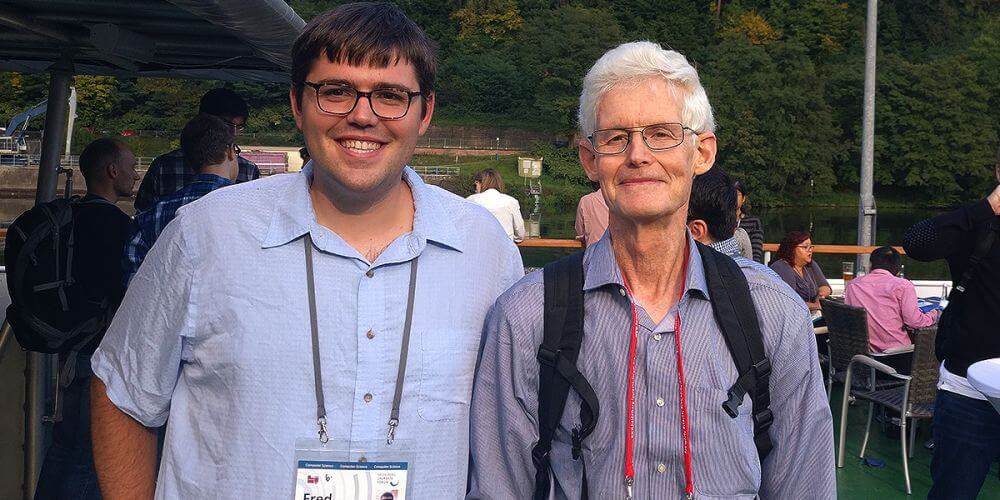
ISI computer scientist Fred Morstatter (left) pictured at the 2017 Heidelberg Laureate Forum with ACM Turing Award recipient Stephen Cook.
ISI computer scientist Fred Morstatter was among 200 top students and early-career researchers selected to participate in the 2017 Heidelberg Laureate Forum in Heidelberg, Germany.
Morstatter, who joined ISI in July 2017 after receiving his PhD from the Arizona State University, attended the weeklong cross-generational forum Sept. 24-29, which brought together talented young scholars with prominent scientists in computer science and mathematics.
Organized by the non-profit Heidelberg Laureate Forum Foundation, the laureates in attendance included recipients of the Fields Medal, the ACM A.M. Turing Award, the ACM Prize in Computing, the Nevanlinna Prize, and the Abel Prize.
Throughout the week, forum participants attended formal lectures presented by the laureates, and took part in workshops with international colleagues.
“Learning from these incredibly famous people in the field and discovering how their careers had evolved was an amazing experience,” says Morstatter.
“It was a unique opportunity to engage with top researchers across generations and meet with new friends and potential collaborators from countries all over the world.”
Morstatter was one of 21 top U.S. students and postdoctoral researchers sponsored to attend the event by Oak Ridge Associated Universities and the National Science Foundation, which included full travel sponsorship.
At the forum, Morstatter was also selected to present his research, focusing on detecting and mitigating bias in social media.
“Social scientists ultimately want to understand society by mining social media and extracting patterns, but that data is frequently not representative of the population, which results in skewed analyses,” says Morstatter, whose paper on the subject has received more than 500 citations.
Causes include unrepresentative APIs, malicious users such as bots and shills spreading misinformation, and perceptual bias. To address this problem, Morstatter created tools to help researchers measure the extent of bias in a data source, which has been used by hundreds of computer scientists.
Morstatter has also co-written a book and two book chapters, and authored or co-authored seven papers in publications including the Journal of Data Science and Analytics, PLoS ONE, and Social Network Analysis and Mining.
At ISI, he is currently part of the Machine Intelligence and Data Science (MINDS) group, which recently received a multi- million-dollar IARPA contract to create human-machine hybrid forecasting systems to better predict geopolitical events through the Synergistic Anticipation of Geopolitical Events (SAGE) project.
Published on October 18th, 2017
Last updated on May 20th, 2021













